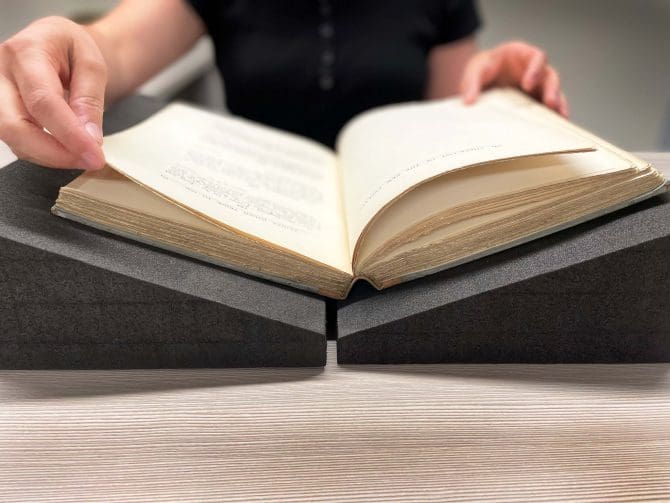Special Collections: Use Our Collections
 Boston Public Library’s Special Collections are open to all.
Boston Public Library’s Special Collections are open to all.
We encourage researchers from all backgrounds to engage with our collections for research projects, school assignments, documentary films, news articles and blog posts, genealogical family research, or general curiosity. Our materials span centuries, continents, and formats. From medieval manuscripts to modern photographs, we have prints, music, photographs, fine art, letters, documents, and books that cover a vast range of topics, time periods, and interests.
We invite you to use our materials in our reading room at the Central Branch of Boston Public Library, to talk to our librarians, archivists, and curators for reference assistance and scans, or to learn more about publishing with our collections.
Request Items from our Collections
Everyone is welcome to use our collections. To view materials in person in our reading room or request scans of materials for your personal use, submit a request through your reading room account.
- Log into or create a reading room account at readingroom.bpl.org and select “New Requests.”
- Choose a request form (arts & archival materials, books & bound manuscripts, or maps) and fill out the form with as much detail as possible. Skip any fields you don’t know or enter ‘unknown’.
- Not sure which form to use or uncertain about the details of your request? Feel free to simply go with your best guess! Our staff will review each request and contact you with any questions.
- Under “Request Type” choose whether you’d like to schedule an appointment to see things in-person or request digital scans of the materials.
- For appointments, use the “Schedule a New Appointment” button to choose the date and time you’d like to come in. To add additional request to the same appointment, fill out another form and use the dropdown field to select the appointment you created.
- For scan requests, prove as much details as possible of what you would like scan, including filling out the format and resolution fields. Staff can provide up to 30 minutes of free scanning services and will contact you with any questions or issues with your scan request.
- Look out for an email from our staff! For reading room appointments, we will either email you with a confirmation email or additional questions to process your requests. For scan requests, we’ll either send a link when the scans are complete or reach out with any questions or issues regarding your scan request.
If you found an item through searching the BPL online catalog or visiting ‘archives.bpl.org’, you can use the ‘request an item’ button to fill out the request form automatically. Simply add the appointment or scan request details at the bottom, and submit!
If you aren’t sure what you’d like to see, write to us! Our staff are happy to help you search for items relevant to your interests.
Using the Reading Room
At least a week before your appointment, submit requests for all materials you wish to see during your visit. Depending on the collections you are using, some materials may take additional time to prepare. If you’re unsure what you need to request, contact us. We’re happy to provide reference services before your appointment to make sure you have everything you need.
If you will need to consult reference materials during your visit, whether from our collections or your own personal material, let us know by replying to the appointment confirmation email you’ll receive.
Reference Scanning Services
The Boston Public Library Special Collections provides limited reference scanning services, free of charge. If you are interested in requesting scans of materials, fill out a request form at readingroom.bpl.org with as much information as possible. We’ll be in touch with any questions or clarifications needed.
When you request scans, we’ll look at the size and format of the material, the amount requested, how thoroughly the material is described, and the physical condition of the material. Due to staffing limitations, we cannot spend more than 30 minutes per request. Some material may be too large, fragile, unprocessed, or in a format that does not permit scanning. Depending on the items requested, we’ll get back to you within 1-3 weeks.
Harmful Language Statement
Boston Public Library catalog records, finding aids, and other collection data describe historical materials that reflect the attitudes, ideas, and norms of the time periods and cultures in which they were created and may include direct quotations, images, or detailed descriptions of original documents that incorporate inappropriate or harmful language used to describe persons and events. This includes language that is racist, misogynistic, homophobic, or ableist.
While we strive to describe collections in an equitable and inclusive manner, we recognize that this has not always been the case. Descriptive tools reflect the biases of the librarians, staff members, and affiliates who created them and sometimes contain harmful language, prioritize access to information about white, male creators, and deprioritize description and access to materials about women and people of color.
Legacy description and potentially offensive content may be made available online because the access that they provide to primary source materials is uniquely valuable to the research community at large. Our efforts to repair outdated descriptions and to describe our collections more equitably are iterative and ongoing.
